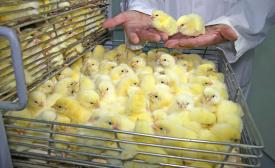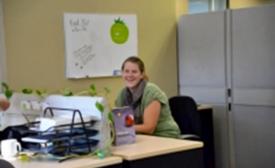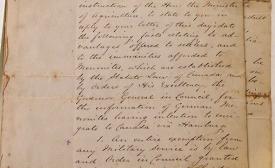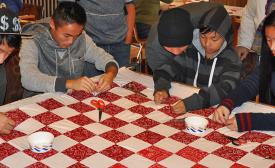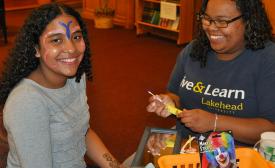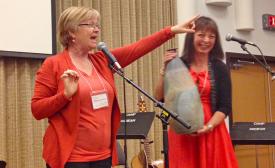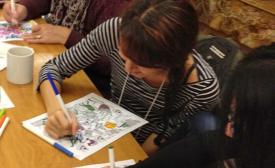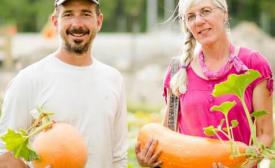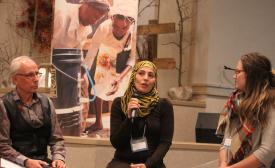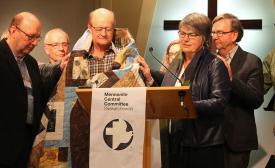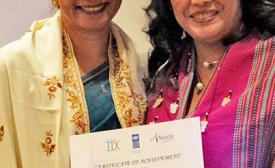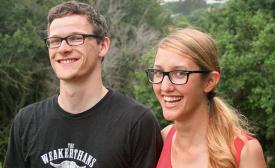Volume 19 Number 23
Peace more than pacifism
Incubating peace
Readers write: November 23, 2015 issue
Ministry in diversity
It’s a miracle
December 24. Late morning. I am in the kitchen, making a pot of soup, savouring its scents and colours. Lovely Christmas music pours from the radio. I’m hoping this domestic activity will centre me in the wake of the stormy currents that accompany the season. How do we ponder all these things, like Mary did, when we are assaulted by such a crush of busyness?
Sometimes you need to receive
Some time ago, during a morning walk, I found a wallet a few blocks from my house. I looked around, hoping the owner might still be close by, but there was no one. Just me. A peek inside revealed a library card, a health card and $25 in bills. That was it. No credit cards. No driver’s licence. Nothing with an address or a phone number.
Advent is life
The weeks leading up to Christmas brought an overwhelming spirit of anticipation to our household when I was growing up. In fact, the intensity of waiting to open our gifts on Christmas morn was too much for my brother and me to bear.
‘These records are unique’
‘We should do this again’
Retreat sparks women’s spiritual gifts
Stewarding agricultural diversity across cultures
Canadian Mennonite University (CMU) made headlines this fall when it was revealed that workers at its CMU Farm had successfully grown an ancient variety of squash from seeds shared with them by the White Earth Seed Library in Minnesota. The squash was grown in collaboration with members of Manitoba’s Métis community.
Will Trudeau boost Mennonite causes?
Welcoming the stranger
“You maybe can’t save all the lives, but you can save some.” With these words, Doha Kharsa encouraged her audience to sponsor refugees. Kharsa, herself a Syrian refugee who arrived in Canada a year ago, spoke at Mennonite Central Committee (MCC) Saskatchewan’s Encounter and annual general meeting, held Nov. 7 at Parliament Community Church.
Leadership changing at MCC Saskatchewan
A God bigger than this mess
Miller had major impact on the church
Coffee for Peace wins UN award
Coffee for Peace won a certificate of achievement from the United Nations Development Programme. It was one of six winners in the UN’s IIX N-Peace Innovation Challenge for “sustainable, scalable, inclusive peacebuilding, that has long-term and transformative impact.” The award was presented to Coffee for Peace founder and CEO Joji Pantoja in New York City on Oct. 23, 2015.
Challenged, changed, rewarded

We spent a lot of time on the road, travelling to meet with different partner organizations. This road is in the Drakensberg Mountains. (Photo by Aaron Janzen)

Durban, South Africa, with a population 3.4 million people, was our home. It is located on the southeast coast in the province of KwaZulu-Natal. (Photo by Aaron Janzen)

Durban, South Africa, with a population 3.4 million people, was our home. It is located on the southeast coast in the province of KwaZulu-Natal. (Photo by Aaron Janzen)

In Durban, and KwaZulu-Natal more broadly, much of MCC’s work revolved around working with refugees and South Africans to promote peace and respond to xenophobia. This is a march on World Refugee Day sponsored by MCC’s partner, Refugee Social Services. (Photo by Aaron Janzen)
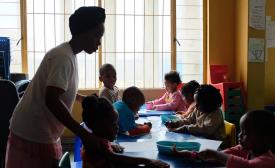
The Children’s Care Centre is located in the downtown core of Durban, South Africa. It is an ‘edu-care’ centre run by the Union of Refugee Women. The centre provides a safe learning environment that brings together refugee and South African children. (Photo by Aaron Janzen)
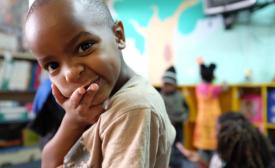
Daniel is a student at the Children’s Care Centre in downtown Durban, South Africa. The centre is one of MCC’s Global Family programs. (Photo by Aaron Janzen)
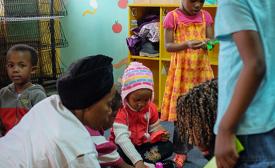
The Children’s Care Centre is located in the downtown core of Durban, South Africa. It is an ‘edu-care’ centre run by the Union of Refugee Women. The centre provides a safe learning environment that brings together refugee and South African children. (Photo by Aaron Janzen)
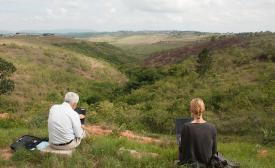
Thanks to laptops, we were able to work anywhere. Here Suzanne Braun and James Alty, who was MCC co-representative for SwaLeSA while we were there, do some work while waiting for a meeting with the director of an HIV/AIDS clinic in rural Swaziland. (Photo by Aaron Janzen)
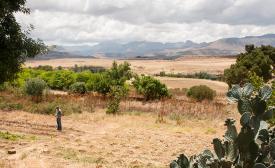
Lesotho is a small kingdom located high up on a plateau in the middle of South Africa. A dry climate, lots of soil erosion and changing seasons make agriculture very difficult. MCC works with Growing Nations Trust to promote conservation agriculture to local farmers. This photo shows some of Growing Nations Trust’s experimental plots. (Aaron Janzen)
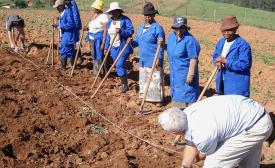
James Alty leads a conservation agriculture workshop in a township near Pietermaritzburg, South Africa. The chain he is holding provides a clear line so that the crop rows are precise. (Photo by Aaron Janzen)

Most of our travel was for MCC work purposes, but occasionally we had the opportunity to travel for recreation. This photo shows some Basotho men dressed up for tourists at the top of Sani Pass, a road that connects Lesotho and South Africa right through the Drakensberg Escarpment. (Photo by Aaron Janzen)
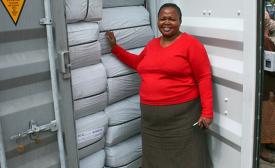
Hlobisile Nxumalo, the executive director of Acts of Faith, stands in front a recently arrived shipment of blankets and HIV/AIDS care kits donated by MCC’s constituency. These materials will be distributed by home-based caregivers to people living with HIV/AIDS in the Ezulwini Valley of Swaziland. (Photo by Aaron Janzen)
My partner Suzanne Braun and I spent three years as Mennonite Central Committee (MCC) service workers in South Africa, Swaziland and Lesotho from 2011-14. As the connecting peoples coordinator and planning, monitoring and evaluation coordinator, we worked to support a wide variety of MCC partner organizations throughout the SwaLeSA area.
Winnipeg churches throw wedding party for Syrian refugee couple
Making a difference

Arnaud Mennonite Church youth group members Meagan Schlorff, left; Cole Holdrick, second from left; Liam Thiessen, third from right; and Adrian Thiessen, right, are pictured with youth leader Ewald Boschmann, third from left and Art Enns, the farmer who donated the land, to celebrate a successful harvest that raised $12,600 for the Canadian Foodgrains Bank. (Canadian Foodgrains Bank photo)
In the Bible, there’s a well-known story about Jesus miraculously feeding five thousand with only a few loaves and fish.





